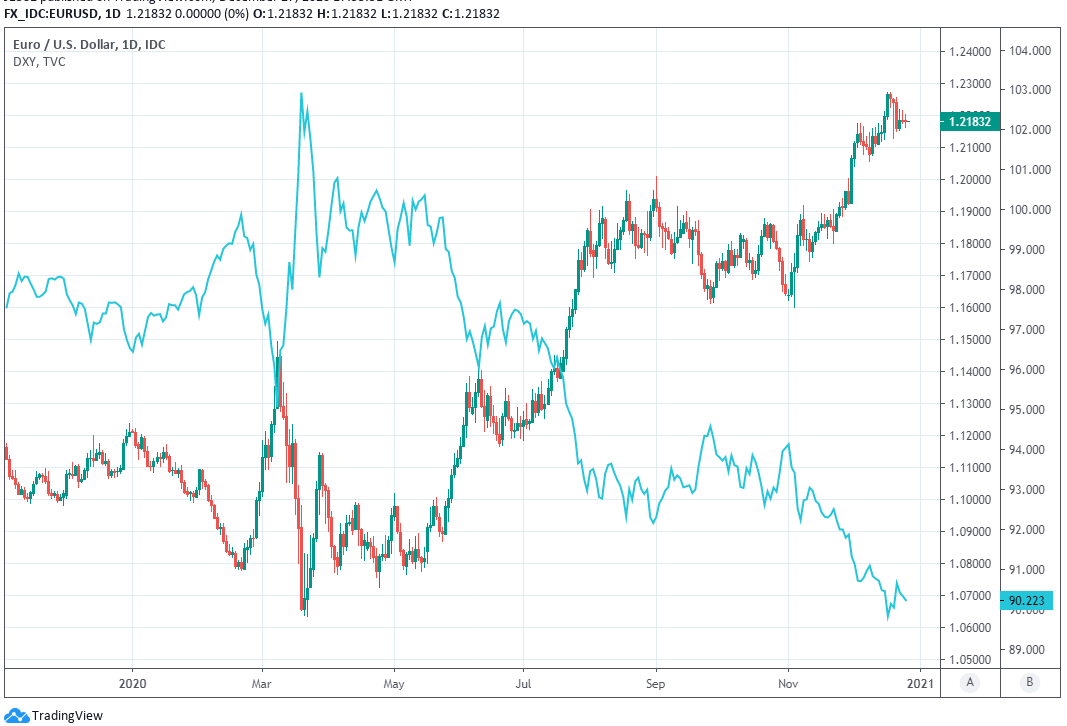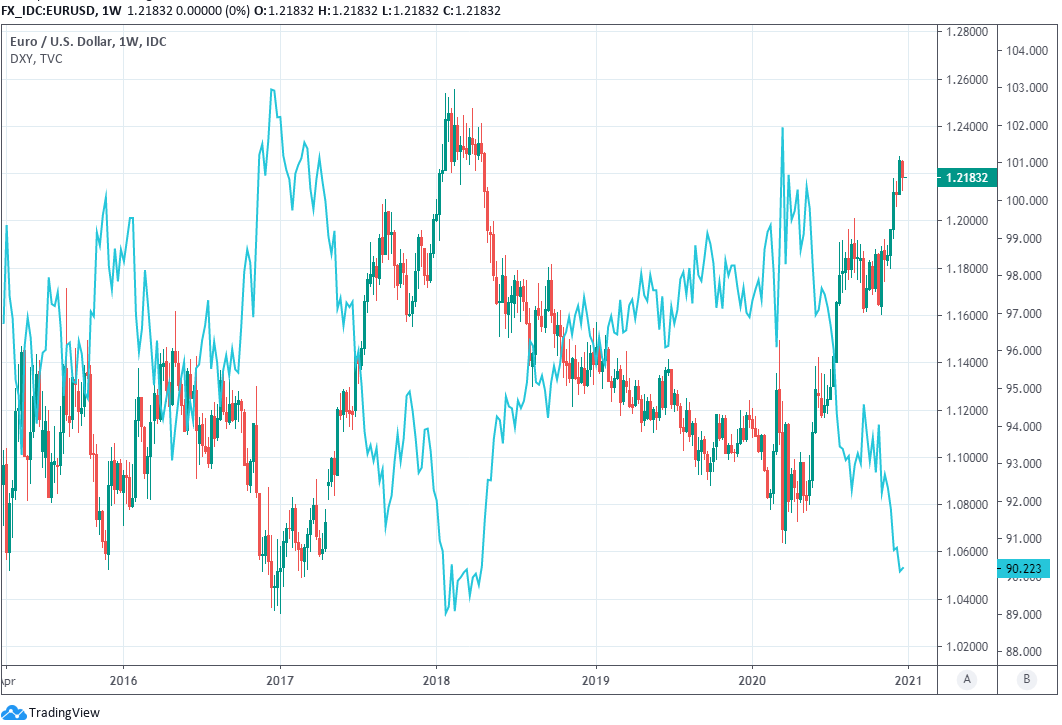Euro-Dollar Week Ahead Forecast: Resilient as Vaccine Rollout, Brexit Deal Offer Support
- Written by: James Skinner
- EUR/USD supported at 1.2177 and near 1.20 into year-end.
- As Brexit deal averts disaster & vaccine rollout begins in EU.
- May insulate EUR/USD from U.S. 'stimulus bill' uncertainties.
- But supply constraints, new viral strain both short-term risks.

Image © European Central Bank
- EUR/USD spot rate at time of writing: 1.2197
- Bank transfer rate (indicative guide): 1.1759-1.1845
- FX specialist providers (indicative guide): 1.2003-1.2101
- More information on FX specialist rates here
The Euro-to-Dollar exchange rate could be set to showcase its resilience in the holiday-shortened week ahead as a Brexit trade deal and beginning of a mass European vaccination programme offer insulation from any investor unease over a stalled U.S. 'stimulus bill.'
Europe's single currency ebbed from near three-year highs last week as a new and more infectious strain of coronavirus combined with uncertainty about the Brexit negotiations as well as path ahead for an eagerly-anticipated fiscal aid package in the U.S. all served to weigh on risk appetite.
“Now is the time for the Council and the European Parliament to analyse the agreement reached at negotiators’ level, before they give their green lights," says Charles Michel, a former Belgian Prime Minister and current head of the European Council.
But with Britain and the EU closing one chapter in the Brexit saga last week, while EU countries belatedly moved forward with the rollout of a coronavirus vaccine, the Euro could find itself well supported at or around Thursday's closing levels over the coming days.This is despite President Donald Trump's 'pocket veto' of the eagerly-anticipated fiscal relief bill, which also included or otherwise came alongside provisions for defence spending and a range of other programmes including overseas aid.
"Markets generally see this as a very watered-down version of the stimulus bill as Democrats initially wanted a USD 2-2.5trn package and even Steve Mnuchin wanted something bigger than this ahead of the election. Trump has though offered a last-minute chance of an increased wallet in the fiscal deal," says Martin Enlund, chief FX strategist at Nordea Markets. "Else, all political focus is now on the Georgia re-runs on 5 January. The Republicans will not be incentivised to back anything at all after those should they keep the Senate majority alive (our base case). Should Democrats tip the majority, markets will likely chase another (larger) package."
Above: Euro-to-Dollar rate shown at daily intervals alongside U.S. Dollar Index (blue line, left axis).
An already announced veto of the defence contingent and supposed pocket veto of the coronavirus relief bill has led to the expiry of some crucial unemployment benefits for workers and also risks prompting a short-lived U.S. government shutdown. The whole affair is effectively now an internecine Republican catfight with ideological motivations and associated dogma at its core, but one which may be enough to encourage caution among investors and limit the upside for the Euro this week.
"Slips below the 1.2177 early December high should find initial support at 1.2088/58, the December 9 low and the nearby uptrend. Further support can be spotted at the 1.2014 September peak," says Axel Rudolph, a senior technical analyst at Commerzbank, who has a neutral view on the Euro this week but sees it rising to its 200-week average at 1.2624 in the months ahead.
Coronavirus vaccinations were underway across Europe on Saturday and Sunday using the immunisation candidate made by Pfizer and BioNTech, which puts light at the end of the tunnel for the battered and bruised Eurozone economy, much of which remained under a kind of 'lockdown' this weekend. But strategists at Nordea Markets have warned of risks associated with the new and more infectious strain of coronavirus found in the UK and looming delays to the production and delivery of the vaccine.
{wbamp-hide start} {wbamp-hide end}{wbamp-show start}{wbamp-show end}
"Expect more groundings of flights once it becomes clear that the spread of the mutated virus has already begun in continental Europe," says Andreas Steno Larsen, chief FX strategist at Nordea. "According to Der Spiegel, the EU allegedly rejected an offer to buy another 200m vaccines from BioNTech (Germany) to ensure that Sanofi (France) got a similar-sized order. Sanofi has by the way postponed the projected vaccine date by at least six months recently. A scandal in the making if there is any truth to the story...It is almost impressively bad that the EU will lose the vaccine race to the UK and the US even though the first effective vaccine was developed on German soil, but a one-size-fits-all policy set-up is always bound to be slower than peers."
Britain notified the World Health Organization last week that a separate and more infectious strain of the coronavirus had been found and was spreading in England and other parts of the UK, prompting more than 40 countries to ban inbound flights from Blighty - although not before the new disease was first found in the Netherlands and other European countries too. This could mean fresh-Europe facing curbs on travel are only a matter of time and is a potential constraint for the EUR/USD rate this week.
"The market couldn’t muster any sort of a rally yesterday despite GBPUSD’s surge following Sky News' premature BREXIT TRADE DEAL DONE headline, and EURUSD sellers have since emerged twice at the 1.2210s (Tuesday’s support turned resistance). We think Tuesday’s flip back to negative for the 1-month EURUSD risk reversal is worthy of mention, because it continues to show the FX option market’s lack of conviction for euro/dollar upside," says Eric Bregar, head of FX strategy at Exchange Bank of Canada in a Thursday note.
Above: Euro-to-Dollar rate shown at weekly intervals alongside U.S. Dollar Index (blue line, left axis).






